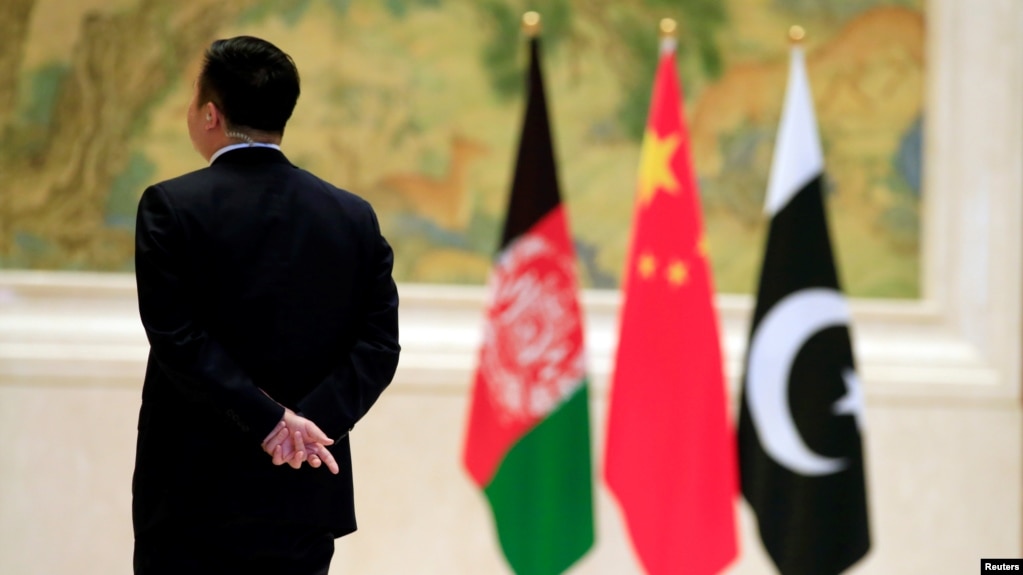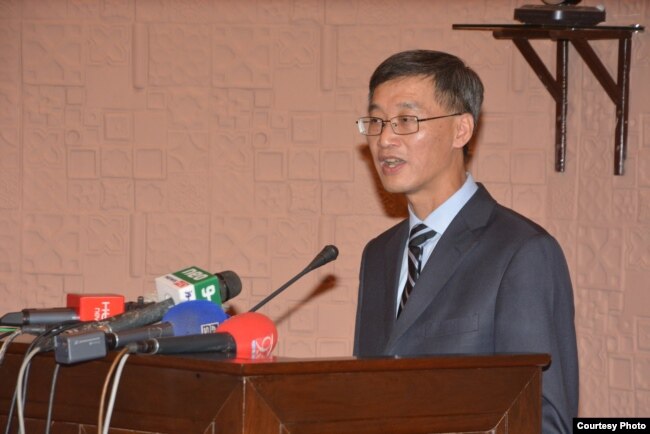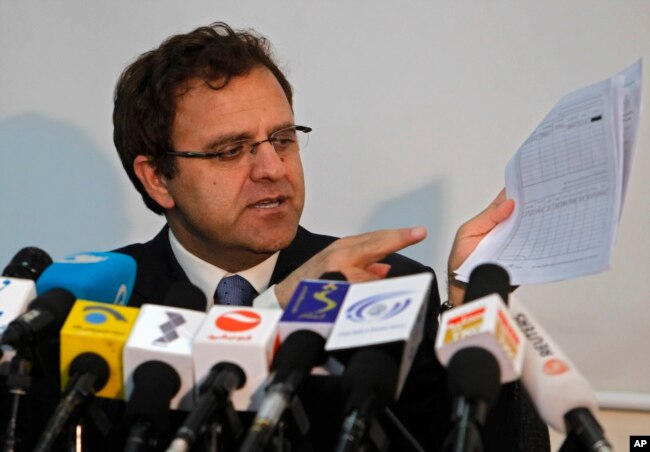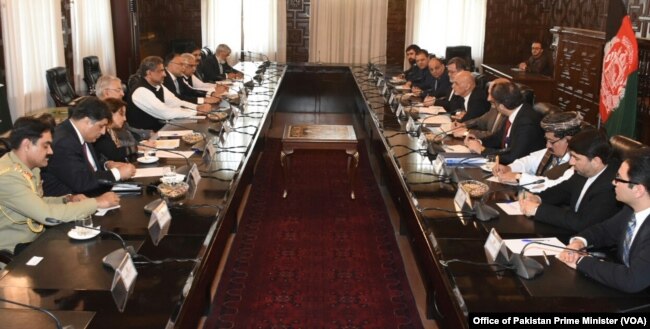Ayaz Gul
 China has proposed hosting a new round of three-way talks with Pakistan and Afghanistan this month to continue with its diplomatic push in helping the two neighboring countries improve their strained bilateral ties. Chinese Ambassador to Pakistan Yao Jing told an unofficial conference of government representatives and experts from the three countries in Islamabad on Tuesday that Beijing had initiated the trilateral vice foreign ministers-level dialogue in 2015. He said that since then, several rounds of talks have taken place, with the mission of easing Kabul's tensions with Islamabad and promoting security, counterterrorism and economic cooperation among the three nations.
China has proposed hosting a new round of three-way talks with Pakistan and Afghanistan this month to continue with its diplomatic push in helping the two neighboring countries improve their strained bilateral ties. Chinese Ambassador to Pakistan Yao Jing told an unofficial conference of government representatives and experts from the three countries in Islamabad on Tuesday that Beijing had initiated the trilateral vice foreign ministers-level dialogue in 2015. He said that since then, several rounds of talks have taken place, with the mission of easing Kabul's tensions with Islamabad and promoting security, counterterrorism and economic cooperation among the three nations.
"So, for this purpose the Chinese government has proposed to ... hold the next round of the strategic dialogue and also the practical cooperation dialogue at the end of this month in Beijing," Jing announced.
The engagement will further enhance "our sense of common community, our sense of development, our sense of common destiny for the three countries," he added.
The ambassador underscored that without the participation and common development of neighboring countries, including Pakistan and Afghanistan, Beijing could not achieve development of western China under its global Belt and Road Initiative (BRI).
Major investments
China is investing billions of dollars in Pakistan to build road, rail and communication infrastructure, power plants and ports to connect the two countries. Beijing has declared the megaproject, known as the China-Pakistan Economic Corridor (CPEC), as the flagship project of BRI.
But both Chinese and Pakistani officials admit a peaceful Afghanistan is vital for promoting mutual and regional economic cooperation.
 FILE - Chin's ambassador to Pakistan, Yao Jing, Islamabad, April 20, 2018 (Courtesy: Pakistan China Institute)
FILE - Chin's ambassador to Pakistan, Yao Jing, Islamabad, April 20, 2018 (Courtesy: Pakistan China Institute)
"Afghanistan, Pakistan occupy the central part, the hub of this initiative. ... Afghanistan is so crucial for the success of this initiative," Jing said.
He praised Islamabad and Kabul for achieving progress in bilateral negotiations hosted on Monday by Pakistan.
Senior foreign ministry officials of the two countries have agreed after months of deliberations to further bilateral engagements under a formal framework for resolving issues straining mutual ties and for promoting a peaceful end to the Afghan war.
The Chinese Foreign Ministry also issued its formal reaction to the progress made in Monday's talks between the two estranged neighbors.
"We believe that it will help create an enabling environment for the early realization of peace in Afghanistan and contribute to the two sides' efforts to uphold peace and development of their two countries, as well as the whole region," ministry spokesperson Lu Kang said.
 FILE - Omar Zakhilwal, then Afghanistan's finance minister, is pictured at a news conference in Kabul, Aug. 7, 2012.
FILE - Omar Zakhilwal, then Afghanistan's finance minister, is pictured at a news conference in Kabul, Aug. 7, 2012.
Trade, security talks
While addressing Tuesday's trilateral conference, Afghan Ambassador Omar Zakhilwal appeared upbeat about Kabul's security and trade-related talks with Islamabad, and said they were on track. He noted that impediments in trade and transit to his landlocked country through Pakistan had been significantly reduced as a result of recent engagements.
Zakhilwal credited an improved environment for Monday's productive talks, where both sides agreed on the Afghanistan Pakistan Action Plan for Peace and Solidarity (APAPPS) framework of dialogue formulated by Islamabad.
"It took us only three hours to finalize [the APAPPS] and inshallah [God willing], we will put it to implementation," the Afghan ambassador vowed.
"There is now more direct military-to-military contact. A lot of disputes that arise, now they directly talk to each other and defuse tensions along the Durand Line [Pakistan-Afghanistan border]," Zakhilwal said. He noted that both countries were working on more bilateral high-level visits.
Afghanistan and Pakistan share a nearly 2,600-kilometer, largely porous border. Islamabad has lately started constructing a fence on the frontier to stop terrorist infiltration in either direction, officials say. The plan has fueled tensions and often provokes cross-border skirmishes because Kabul disputes the British early demarcation of 1893.
Pakistan's National Security Adviser Nasser Janjua, while speaking at Tuesday's conference, acknowledged China's proactive diplomacy was helping to ease regional tensions. He emphasized the need for both countries to separate politics from economic ties.
"Pakistan and Afghanistan should complement each other by becoming a trade corridor. And that is where China is a great help. ... Pakistan, Afghanistan, let us value each other. Let us make use of this opportunity. Let's engage ourselves constructively, if not for ourselves, for our children," Janjua said.
Tensions between Afghanistan and Pakistan stem from allegations that the Taliban uses sanctuaries on Pakistani soil to sustain its violent campaign, while Islamabad says fugitive anti-state militants use "ungoverned" Afghan areas to plot terrorist attacks against the country.
 FILE - Pakistan Prime Minister Shahid Khaqan Abbasi and Afghan President Ashraf Ghani lead their respective delegations in formal talks, April 6, 2018, in the presidential palace in Kabul.
FILE - Pakistan Prime Minister Shahid Khaqan Abbasi and Afghan President Ashraf Ghani lead their respective delegations in formal talks, April 6, 2018, in the presidential palace in Kabul.
Efforts on Taliban
Pakistan's Janjua and China's Jing both praised Afghan President Ashraf Ghani's recent offer of peace talks to the Taliban insurgency. The insurgents have not yet responded, and instead have intensified attacks in Afghanistan.
"It is for the first time ever that such an initiative has been taken that peace has been given a chance. We have not succeeded in Afghanistan because everyone has been investing in the war. This is for the first time that we are talking of peace," Janjua noted.
The Pakistani adviser explained the importance of Afghan peace for his nation: "We all are aware that we have got a war haunting our streets, haunting our children anywhere and everywhere, same as Afghanistan. That's why I say that we are partners in pains and sufferings."
China, Afghanistan and Pakistan over the past two years also have launched a trilateral engagement at the foreign ministers level, and the three sides are scheduled to meet in Kabul for another round of talks later this year.
Beijing is engaged economically in Afghanistan, but its active political involvement in promoting Afghan peace stems from concerns that continued Afghan war and instability will encourage terrorist groups like Islamic State to expand their footprints in the region and ultimately will threaten the restive western Chinese region of Xinjiang.
"This terrorism is a regional problem, and I think a regional problem needed a regional approach to deal with it. So, China, we definitely want to engage Afghanistan, engage Pakistan along with other regional partners in successfully dealing with the challenge of terrorism," Jing said.
No comments:
Post a Comment